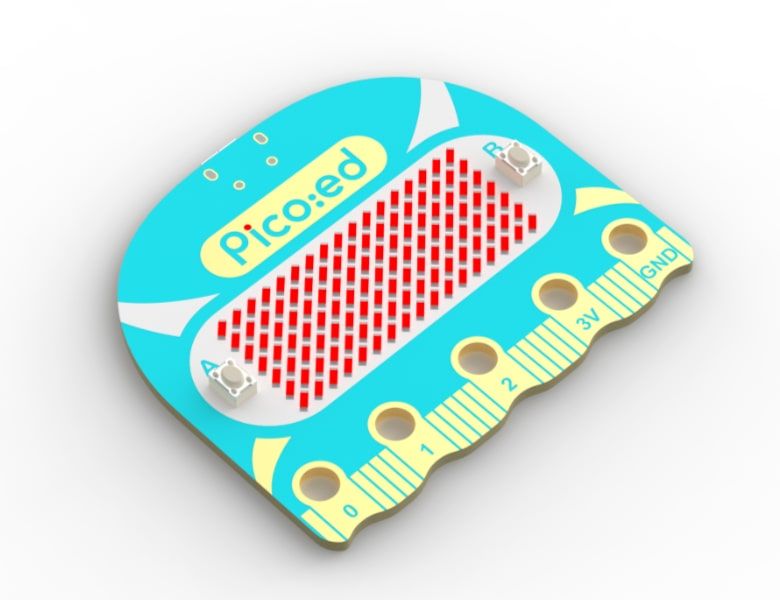
ELECFREAKS Pico:ed by ELECFREAKS
The Pico:ed is a development board based on Raspberry Pi RP2040 MCU. It uses dual-core Arm Cortex-M0+ processor with 264KB RAM. The front of the board contains two buttons and a 7x17 dot matrix screen, which can be conveniently used for classroom teaching.
So why choose Pico:ed?
- A development board based on RP2040. Make it easier to use our Pico:ed in the classroom.
- Wavy edge connector to connect to devices without soldering.
- 7x17 LED fully programmable display. Can display text, numbers, and images.
- Two programmable buttons and logo LED.
- There is a button that can be reset directly RP2040.
- Designed by Raspberry Pi, RP2040 features a dual-core Arm Cortex-M0+ processor with 264kB internal RAM and support for up to 16MB of off-chip flash.
- A buzzer for playing beeps and tones.
Features
- Raspberry Pi RP2040 Chip
- 7x17 LED matrix screen
- Built-in LED
- Built-in buzzer
- 2 programmable buttons
- USB & battery connector
- Power status LED
- Bootsel & reset button
- 25-pins notched edge connector
- Exquisite design
Specifications
- MCU: RP2040
- SRAM: 264kB
- Flash: 2MB
- Programmable IO: 19 Pcs
- Onboard Device: Buzzer, LED, 7x17 LED matrix, 2 Buttons
- Program Language: CircuitPython/MicroPython,C++
- Size: About 52mm x 42mm
- Net Weight: 10g
Documentations
Purchase
Contribute
Have some info to add for this board? Edit the source for this page here.
CircuitPython 10.0.3
This is the latest stable release of CircuitPython that will work with the ELECFREAKS Pico:ed. Use this release if you are new to CircuitPython.
Modules included in this download
_asyncio _bleio _bleio (HCI co-processor) _eve _pixelmap adafruit_bus_device adafruit_pixelbuf aesio alarm analogbufio analogio array atexit audiobusio audiocore audiomixer audiomp3 audiopwmio binascii bitbangio bitmapfilter bitmaptools bitops board builtins builtins.pow3 busdisplay busio busio.SPI busio.UART codeop collections countio digitalio displayio epaperdisplay errno floppyio fontio fourwire framebufferio getpass gifio hashlib i2cdisplaybus i2ctarget imagecapture io jpegio json keypad keypad.KeyMatrix keypad.Keys keypad.ShiftRegisterKeys keypad_demux keypad_demux.DemuxKeyMatrix locale lvfontio math memorymap microcontroller msgpack neopixel_write nvm onewireio os os.getenv paralleldisplaybus pulseio pwmio qrio rainbowio random re rgbmatrix rotaryio rp2pio rtc sdcardio select sharpdisplay storage struct supervisor synthio sys terminalio tilepalettemapper time touchio traceback ulab usb usb_cdc usb_hid usb_host usb_midi usb_video vectorio warnings watchdog zlibIncluded frozen(?) modules: adafruit_is31fl3731, adafruit_motor, adafruit_ticks, asyncio, elecfreaks_music, neopixel, picoed
Features: Speaker, Display, Solder-Free Alligator Clip
CircuitPython 10.1.0-rc.1
This is the latest development release of CircuitPython that will work with the ELECFREAKS Pico:ed.
Alpha development releases are early releases. They are unfinished, are likely to have bugs, and the features they provide may change. Beta releases may have some bugs and unfinished features, but should be suitable for many uses. A Release Candidate (rc) release is considered done and will become the next stable release, assuming no further issues are found.
Please try alpha, beta, and rc releases if you are able. Your testing is invaluable: it helps us uncover and find issues quickly.
Modules included in this download
_asyncio _bleio _bleio (HCI co-processor) _eve _pixelmap adafruit_bus_device adafruit_pixelbuf aesio alarm analogbufio analogio array atexit audiobusio audiocore audiomixer audiomp3 audiopwmio binascii bitbangio bitmapfilter bitmaptools bitops board builtins builtins.pow3 busdisplay busio busio.SPI busio.UART codeop collections countio digitalio displayio epaperdisplay errno floppyio fontio fourwire framebufferio getpass gifio hashlib i2cdisplaybus i2cioexpander i2ctarget imagecapture io jpegio json keypad keypad.KeyMatrix keypad.Keys keypad.ShiftRegisterKeys keypad_demux keypad_demux.DemuxKeyMatrix locale lvfontio math memorymap microcontroller msgpack neopixel_write nvm onewireio os os.getenv paralleldisplaybus pulseio pwmio qrio rainbowio random re rgbmatrix rotaryio rp2pio rtc sdcardio select sharpdisplay storage struct supervisor synthio sys terminalio tilepalettemapper time touchio traceback ulab usb usb_cdc usb_hid usb_host usb_midi usb_video vectorio warnings watchdog zlibIncluded frozen(?) modules: adafruit_is31fl3731, adafruit_motor, adafruit_ticks, asyncio, elecfreaks_music, neopixel, picoed
Features: Speaker, Display, Solder-Free Alligator Clip
Absolute Newest
Every time we commit new code to CircuitPython we automatically build binaries for each board and language. The binaries are stored on Amazon S3, organized by board, and then by language. These releases are even newer than the development release listed above. Try them if you want the absolute latest and are feeling daring or want to see if a problem has been fixed.
Previous Versions of CircuitPython
All previous releases of CircuitPython are available for download from Amazon S3 through the button below. For very old releases, look in the OLD/ folder for each board. Release notes for each release are available at GitHub button below.
Older releases are useful for testing if you something appears to be broken in a newer release but used to work, or if you have older code that depends on features only available in an older release. Otherwise we recommend using the latest stable release.
